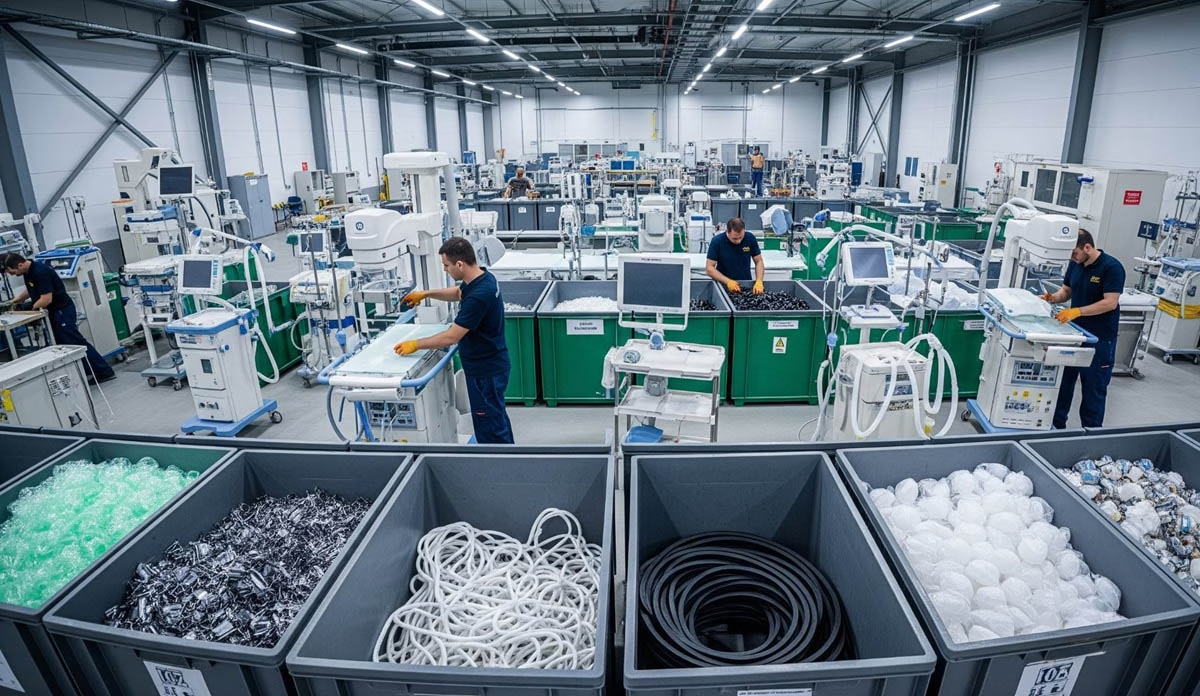Contents
Toggle
Medical Equipment Recycling
Definition of Medical Equipment Recycling
Medical equipment recycling refers to the process of recovering and repurposing devices used within healthcare settings to prevent them from ending up in landfills. It involves a systematic approach to collecting, processing, and redistributing medical devices that can no longer serve their original purpose. This practice not only reduces waste but also serves a greater purpose of resource recovery and environmental conservation.
What is Medical Equipment Recycling?
The concept of medical equipment recycling encompasses various activities, including the collection, decontamination, refurbishment, and resale of medical devices. These can range from surgical instruments and diagnostic machines to entire hospital beds and imaging equipment. By recycling, healthcare facilities can help mitigate the environmental impact of medical waste while also addressing the economic challenges faced by many medical practitioners, especially in under-resourced areas.
Types of Medical Equipment Suitable for Recycling
Numerous types of medical equipment can be recycled. Some of the most common items include:
- Surgical instruments (scalpels, forceps, scissors)
- Diagnostic machines (X-ray machines, ultrasound devices)
- Hospital beds and stretchers
- Electronics (monitors, pumps, and sensors)
- Personal protective equipment (PPE) like masks and gowns)
Each category requires specific handling and processing techniques to ensure that they can be safely reused or repurposed while adhering to health and safety regulations.
Environmental Impact of Improper Disposal
Improper disposal of medical equipment poses significant threats to the environment and public health. When healthcare waste is not properly managed, it can lead to contamination of landfills and surrounding ecosystems. Medical devices often contain hazardous materials, such as mercury, lead, and plastic components, which can leach into the soil and groundwater, causing long-term environmental harm.
Consequences of Improper Medical Equipment Disposal
The repercussions of improper disposal can extend far beyond immediate environmental damage. Contaminated water supplies can pose health risks to local communities, potentially leading to diseases associated with exposure to hazardous substances. Additionally, improperly discarded medical waste can attract pests and contribute to unsanitary conditions, creating further public health risks.
Effects on Landfills and Ecosystems
Landfills are not designed to accommodate medical waste, and the accumulation of such materials can disrupt local ecosystems. Wildlife may ingest toxic substances or become entangled in discarded medical devices. The degradation of these materials can also release harmful pollutants into the environment, affecting air quality and contributing to climate change.
Legal Compliance and Regulations
Healthcare facilities must navigate a complex landscape of regulations governing the disposal of medical equipment. These regulations are designed to protect public health and the environment, and non-compliance can result in severe penalties, including fines and legal action.
Overview of Relevant Regulations
Key regulations include the Resource Conservation and Recovery Act (RCRA), which governs hazardous waste management, and the Medical Waste Tracking Act, which specifically addresses the disposal of medical waste. Additionally, the Occupational Safety and Health Administration (OSHA) mandates that healthcare facilities implement safety protocols for handling infectious and hazardous waste.
Importance of Compliance for Healthcare Facilities
Compliance with these regulations is essential not only to avoid legal repercussions but also to uphold the integrity and reputation of healthcare institutions. By adhering to waste management laws, healthcare facilities demonstrate their commitment to sustainability and community health.
Benefits of Certified Recycling Programs
Participating in certified recycling programs can offer numerous advantages for healthcare providers. These programs are designed to ensure that medical equipment is recycled in a safe and environmentally responsible manner, often following stringent industry standards.
Advantages for Healthcare Providers
One of the primary benefits of certified recycling is cost savings. By recycling rather than discarding medical equipment, healthcare facilities can reduce disposal costs and recover valuable resources. In addition, many certified programs offer financial incentives for participating institutions, creating a win-win scenario for both the environment and the healthcare provider.
Positive Impact on Community and Environment
Certified recycling programs also help foster goodwill within communities. When healthcare facilities actively engage in sustainable practices, they enhance their public image and build trust with community members. Furthermore, these programs contribute significantly to reducing the environmental footprint of healthcare operations, promoting a cleaner and healthier environment for everyone.
Steps for Implementing Recycling in Healthcare Facilities
Establishing an effective recycling program within a healthcare facility requires careful planning and execution. It is essential to assess current practices and identify areas for improvement.
Assessing Current Disposal Practices
The first step in implementing a recycling program is to conduct a thorough assessment of existing disposal practices. This assessment should include a review of the types of medical equipment being disposed of, disposal methods currently in use, and compliance with relevant regulations. This evaluation will help identify the potential for recycling and highlight the most significant opportunities for improvement.
Developing a Recycling Policy
Once an assessment has been completed, healthcare facilities should develop a comprehensive recycling policy. This policy should outline the types of equipment eligible for recycling, procedures for collection and processing, and staff responsibilities. It is crucial that the policy is communicated effectively to all personnel to ensure buy-in and compliance.
Training Staff and Raising Awareness
Training is a vital component of a successful recycling program. Staff should be educated about the importance of recycling, the specific policies in place, and their individual roles in the process. Regular workshops and informational sessions can help raise awareness and encourage participation. Additionally, providing visual aids, such as posters and infographics, can reinforce key messages and promote proper waste management practices.
Data Security Considerations
As healthcare facilities recycle medical equipment, they must also prioritize data security. Many medical devices contain sensitive patient information, and improper handling can lead to data breaches and violations of patient privacy.
Importance of Data Security in Medical Equipment Recycling
Data security is critical in maintaining patient trust and ensuring compliance with regulations such as the Health Insurance Portability and Accountability Act (HIPAA). Failure to protect sensitive information during the recycling process can result in severe legal consequences and reputational damage to healthcare providers.
Best Practices for Ensuring Patient Privacy
To safeguard patient data, healthcare facilities should establish best practices for data destruction prior to recycling medical equipment. This may include wiping electronic devices, physically destroying hard drives, and ensuring that all data is irretrievable. Partnering with certified recycling programs that specialize in data destruction can further enhance security and provide peace of mind.
Conclusion
Medical equipment recycling is an essential practice that benefits both the environment and healthcare facilities. By understanding the environmental impact of improper disposal, adhering to legal regulations, and implementing effective recycling programs, healthcare providers can play a crucial role in promoting sustainability. Furthermore, prioritizing data security ensures that patient information remains protected throughout the recycling process.
FAQs
-
What types of medical equipment can be recycled?
Commonly recycled medical equipment includes surgical instruments, diagnostic machines, hospital beds, electronics, and personal protective equipment (PPE).
-
Why is it important to recycle medical equipment?
Recycling medical equipment helps reduce waste, minimizes environmental impacts, promotes sustainability, and can result in cost savings for healthcare facilities.
-
What regulations govern medical equipment disposal?
Key regulations include the Resource Conservation and Recovery Act (RCRA) and the Medical Waste Tracking Act, which govern the management and disposal of hazardous and medical waste.
-
How can healthcare facilities implement an effective recycling program?
Healthcare facilities can implement a recycling program by assessing current disposal practices, developing a recycling policy, training staff, and raising awareness about the importance of recycling.
-
What measures should be taken to ensure data security during recycling?
Best practices for data security include wiping electronic devices, physically destroying hard drives, and partnering with certified recycling programs that specialize in data destruction.
